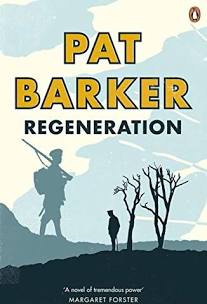Set in 1917, army psychiatrist William Rivers main task is to ‘regenerate’ the shell-shocked soldiers sent to him at Craiglockhart Hospital. It’s the perfect Catch-22 situation. In order to be sent back to the front, Rivers has to sign the men off as mentally fit to be there, but would anyone in their right mind want to return to the killing fields of the Western Front?
Among Rivers patients are the would-be poet Wilfred Owen and established poet and war hero, Siegfried Sassoon. Unfortunately for the authorities, Sassoon has published a declaration denouncing the war. Sassoon is far too famous, too well-known for his courage and with an outstanding war record to boot, for the authorities to court-martial him. At a loss what to do with him, they send him to Craiglockhart in the hope that Rivers will get him to change his mind.
As for Rivers, he has not only to contend with the fall out from the horrors that have traumatized his patients, but he also has to deal with men whose upbringing was such ‘They’d been trained to identify emotional repression as the essence of manliness’. How do you start the healing process, whereby the patient must first admit his fear, if he has spent his whole life being told he should not show any emotion?
Saddled with feelings of guilt and shame, these men are at a loss as to why one particular event, no matter how horrific, should trigger their breakdown, unaware that the unimaginably horrific circumstances they have had to fight under started chipping away at their psyche long before.
Of course, one of the greatest ironies the Great War perpetuated, as Rivers notes, was that these men had grown up reading adventure stories of daring-do whereas their war consisted of sitting in dugouts waiting to be killed. ‘They’d been mobilized into holes in the ground so constricted they could hardly move.’ And far from ‘manly’ heroics, their role was rather a passive one, worrying about their men in a way similar to women worrying about their children. (Before you have a go at me for gender stereotypes, remember we are talking 1917 here!).
However, Sassoon’s arrival seems to be a catalyst for Rivers to question his own attitude to the war and come to the conclusion that ‘A society that devours its own young deserves no automatic or questioning allegiance’. Over time it has become increasingly harder for Rivers not to question his previous conservative stance given his dealings with his patients. Rivers is aware that these men aren’t ‘degenerate’ or ‘weak’, and he is forced to conclude that it is the men’s experience of the war that has led them to breakdown, and thus it’s the war itself which is an issue.
What becomes evident throughout the novel is how haunted these men are: by their experiences, the friends and men they have lost, the yawning gap between the reality of life in the trenches and the public perception of war. These are men without hope and without a future, at odds with the society they are fighting for.
Towards the end of the novel, Rivers visits Dr Yealland at the National Hospital where the treatment of similar patients to Rivers could not be the more polar opposite. Convinced these men are shirkers and that there’s nothing wrong with them, Yealland’s treatment of them is nothing short of torture. Yealland is dismissive of the patients, ignores their depression, is unconcerned about what happens to them after they are ‘cured’. His only concern is their apparent ‘cure’. It makes for some of the most uncomfortable reading of the entire novel.
Not surprisingly, Rivers is horrified by Yealland’s treatment of his patients, but notes that they are both trying to ‘regenerate’ young men so they can resume activities which are ‘not merely self-destructive but positively suicidal’. Is he too not silencing the horrors of war that his patients are bearing witness to if only in a far more humane way? Is he not knowingly signing off on Sassoon’s return to the front, aware that Sassoon plans on getting himself killed, and should Sassoon be denied the chance to do so, Sassoon might breakdown for real this time?
Regeneration is a well-researched, well-written novel. I was left wanting to know more about Owen and Sassoon who didn’t feature in the novel as much as I assumed they would. Obviously, the novel can only scratch the surface of the horrors that soldiers in the trenches lived through, but what you do gleam is horrific enough. Barker evokes the times brilliantly, brings to life an array of traumatized patients that Rivers has to treat, and creates a very sympathetic protagonist in Rivers. At times it’s not an easy read, but it does leave you wanting to find out what happens to these men who paid such a heavy price for ‘doing their bit’ for king and country.


Thanks Maureen. I’m going to give it a read. Sounds really interesting.